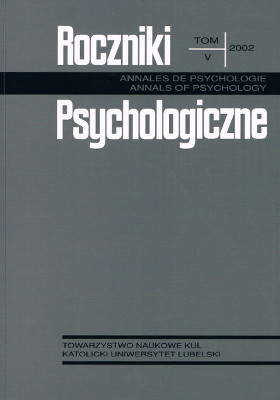Personal experience: The object of qualitative personalistic analysis
Abstract
The present conception of personal experience has its foundations and sources of inspiration in the assumptions of W. Stern’s, G. W. Allporfs and R. May's psychology, in E. Husser’s and E. Stein's phenomenological approach and in M. Heidegger’s existential analysis of human-existence-in-the-world. The personal character of experience in psychology is especially explicitly defined when it is stressed that (1) the person has an experience of the self as of the cognizing subject; (2) the person has an experience of being both the subject and the object; (3) the person has an experience of the-world-he-lives-in, and (4) the person has an experience of an existential event. In this context the belief is expressed that the distinguished aspects of personal experience may be the subject of a detailed analysis of empirical data collected in the form of written reports of an actual life event experienced by the person. Hence I suggest a procedure of qualitative analysis of life events that would be treated as a model, which I define – because of its assumptions - as qualitative personalistic analysis. In the final part of the paper I present - as an example - an analysis of M. Heidegger's own perceptive experience he described (of a blooming tree in the garden). The final result of this kind of analysis is a formulated individual and generalized structure of the described life event as a personal experience.
References
Allport, G. W. (1960). Personality and social encounter. S e lected essays. Boston: Beacon Press.
Allport, G. W. (1988). Osobowość i religia. Warszawa: IW Pax.
Angyal, A. (1941/1972). Foundation fo r a science o f personality. New York: The Viking Press.
Friedman, M. (1992). Existential psychotherapy and the image o f man. J o u rn a l o f Humanistic Psychology, 2, 104-117.
Gibson, J. J. (1979). The e cological approach to visual perception. Boston: Houghton Mifflin Comp.
Giorgi A. (1991). Psychologia jak o nauka humanistyczna w świetle założeń podejścia fenomenologicznego. W: A. Januszewski, Z. Uchnast, T. Witkowski (red.), Wykłady z psychologii w KUL (t. 5). Lublin: RW KUL, s. 309-344.
Heidegger, M. (2000). Co zwie się myśleniem? Warszawa: WN PWN.
Husserl, E. (1935/1993). Kryzys europejskiego człowieczeństwa a filozofia . Warszawa: Biblioteka Aletheia (wykład wygłoszony w Wiedniu 1935 r.)
Luijpen, W. (1972). Fenomenologia egzystencjalna. Warszawa: IW Pax.
May, R. (1958). The origins and significance o f the existential movement in psychology.
W: R. May, E. Angel, H. F. Ellenberger (red.), Existence - A new dimension in psychiatry and Psychology. New York: Basic Books, s. 3-36.
May, R. (1973). Psychologia i dylemat ludzki. Warszawa: IW Pax.
May, R. (1995). O istocie człowieka. Szkice z psychologii egzystencjalnej. Poznań: Dom Wydawniczy REBIS.
Polanyi, M. (1966). The tacit dimension. Garden City, NY: Doubleday.
Stein, E. (1988). O zagadnieniu wczucia. Kraków: Znak (Oryg. wyd. Zum Problem der Einfüllung, Halle 1917).
Stern, W. (1923). Person und Sache. System des kritischen Personalismus. Band 2: Die menschliche Persönlichkeit. Leipzig: Barth.
Stern, W. (1930). Selbstdarstellung. W: C. Murchison (red.), A history of psychology in autobiography. Rochester, MA: Clark University Press, s. 335-388.
Stern, W. (1938). General psychology from the personalistic standpoint. New York: Macmillan.
Tischner, J. (1989). Filozofia współczesna. Kraków: Instytut Teologiczny Księży Misjonarzy.
Uchnast, Z. (1983). Humanistyczna orientacja w psychologii osobowości. Lublin: RW KUL.
Uchnast, Z. (1990). Problem podmiotowości w ujęciu psychologicznym. Przegląd Psychologiczny, 33, 1, 41-57.
Uchnast, Z. (1993a). Metodologiczne problemy w psychologii humanistycznej. Zeszyty Naukowe UJ. Prace Psychologiczne, 9, 59-74.
Uchnast, Z. (1993b). Psychologiczna analiza doświadczenia świata-w-którym-żyjemy: Podstawowe założenia psychologii fenomenologiczno-egzystencjalnej. Ze szyty Naukowe UJ. Prace Psychologiczne, 9, 109-118.
Uchnast, Z. (1994). Reinterpretacja założeń psychologii postaci: Od modelu całości jak o symbolicznej figury do modelu całości naturalnej jako ekosystemu. Roczniki Filozoficzne, 42, 4, 30-69.
Uchnast, Z. (1995a). Ku psychologii zdarzeń życiowych. W: A. Biela, J. Brzeziński, T. Marek (red.), Społeczne, eksperymentalne i metodologiczne konteksty procesów poznawczych człowieka. Poznań: Wydawnictwo Fundacji Humaniora, s. 117-138.
Uchnast, Z. (1995b). Zdarzenia życiowe osoby ludzkiej: Podejście ekologiczne. Roczniki Filozoficzne, 43, 4, 5-23.
Uchnast, Z. (1996). Empatia jak o postawa egzystencjalna. Roczniki Filozoficzne, 44, 4, 37-52.
Uchnast, Z. (1997). Prężność osobowa: Empiryczna typologia i metoda pomiaru. Roczniki Filozoficzne , 45, 4, 27-50.
Copyright (c) 2002 Roczniki Psychologiczne

This work is licensed under a Creative Commons Attribution-NonCommercial-NoDerivatives 4.0 International License.


